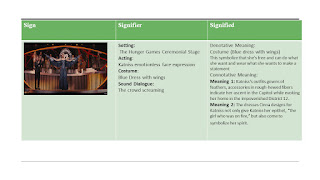Roland Barthes (November 12, 1915 – March 25, 1980) was a French literary critic, literary and social theorist, philosopher, and semiotician. He claimed that any type of objects and images carry literal, denotative, meaning, and non-literal connotative meaning. His ideas explored a diverse range of fields and influenced the development of many theories. The objective of the exercise was to understand when, where, and how meaning is placed in scenes of "The Hunger Games".
Reflection
The objective of the exercise was to be able to recognize and define signs visually and audibly when analyzing media products. Which is myth, denotative, and connotative meanings. We did an exercise called The Theory of Semiotics Analysis. The reason for doing this exercise was to better understand signs in films and the way they play a part. The tools used were PowerPoint slides and the internet web. Which I'm an expert in. It was two members that complete the conversation. Each member had their own slide in which they find meaning for two scene and objects used to convey their meaning in the scenes. In this exercise I learned the way to recognize and define signs.
Worked-Cited
Britannica, The Editors of Encyclopaedia. "Roland Barthes". Encyclopedia Britannica, 8 Nov. 2023, https://www.britannica.com/biography/Roland-Gerard-Barthes. Accessed 24 November 2023
Britannica, The Editors of Encyclopaedia. "semiotics". Encyclopedia Britannica, 17 Nov. 2023, https://www.britannica.com/science/semiotics. Accessed 24 November 2023
Mambrol, N. (2019) Key theories of Roland Barthes, Literary Theory and Criticism. Available at: https://literariness.org/2018/03/20/key-theories-of-roland-barthes/ (Accessed: 24 November 2023).






No comments:
Post a Comment